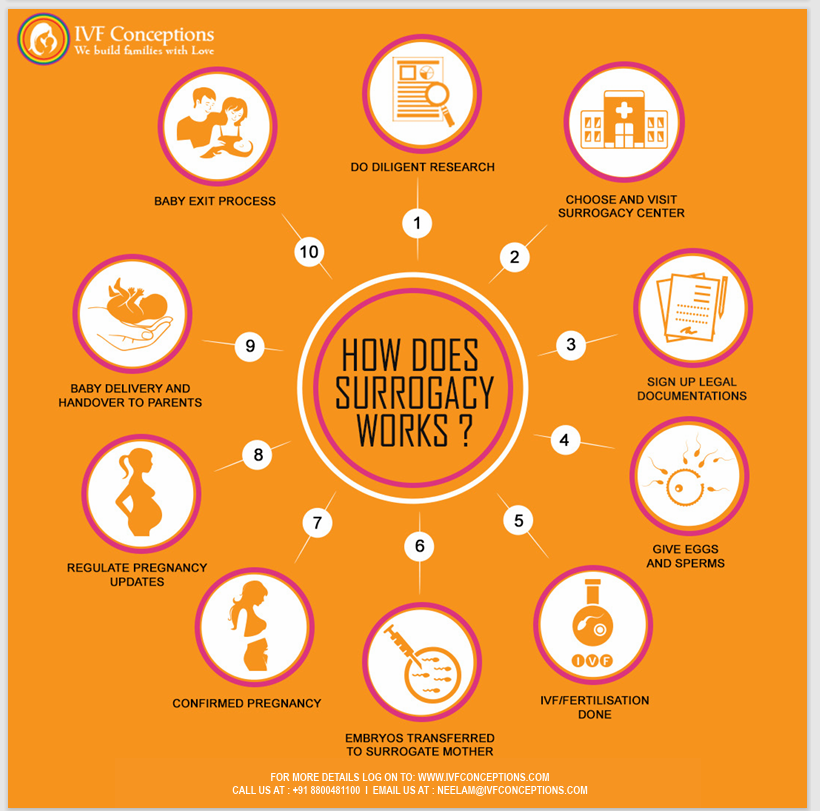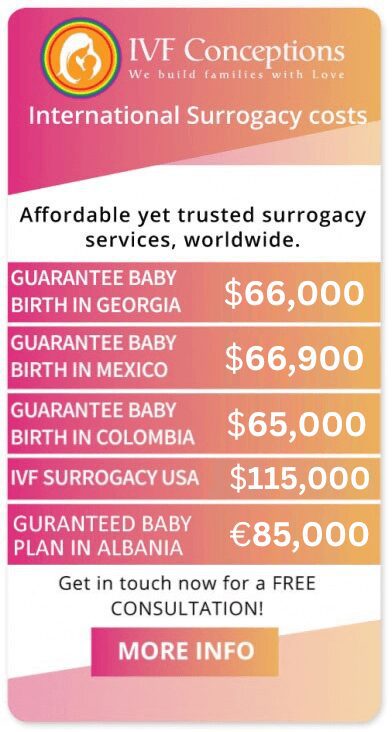Overseas Surrogacy: Exploring the Benefits and Considerations

Navigating the Legal Landscape of Overseas Surrogacy: A Professional Guide
Overseas surrogacy has become an increasingly sought-after option for intended parents looking for affordable surrogacy options abroad. With rising costs and legal restrictions in some countries, many turn to international surrogacy destinations to fulfill their dream of parenthood. However, navigating the legal, ethical, and medical aspects of cross-border surrogacy can be challenging.
- Book an online appointment: Get a free online consultation.
- Call\W:+91-8800481100 Email:neelam@ivfconceptions.com
Each country has different regulations, and ensuring parental rights, ethical treatment of surrogates, and quality medical care is essential. Before choosing a destination, it is crucial to research the best countries for surrogacy to ensure a safe and legally protected journey.
Surrogacy, as a practice, involves a woman carrying a pregnancy for another individual or couple, typically for compensation. While surrogacy has been present throughout history, it has received heightened scrutiny in the modern-day as advancements in reproductive technology have made it a more accessible option for intended parents.
More Resources to Read:
Infertility Treatment and Surrogacy Process
9 Factors To Improve IVF Pregnancy Rate
International Surrogacy Options Worldwide
Surrogacy Guide for Surrogate Mothers
This has led to a rise in the practice of overseas surrogacy, where individuals or couples travel to a foreign country to engage in the surrogacy process.
However, this practice has raised ethical, legal, and social concerns, sparking debates and discussions among various stakeholders.
In this article, we will examine the concept of overseas surrogacy in-depth, exploring its history, current trends, and the implications it has on all parties involved. By providing a comprehensive overview of the topic, this article aims to shed light on the complexities of overseas surrogacy and facilitate a better understanding of its impact on individuals, families, and society as a whole.

Introduction
Surrogacy, a practice that involves a woman carrying a pregnancy for someone else, has been around for centuries, but it wasn’t until the late 20th century that it began gaining widespread attention.
Initially, surrogacy arrangements were primarily conducted within the same country, with intended parents and surrogates residing nearby. However, with the rise of globalization and advances in reproductive technologies, a new phenomenon known as overseas surrogacy has emerged.
Overseas surrogacy refers to the process of individuals or couples traveling to other countries to engage in surrogacy arrangements. This practice has become increasingly popular for several reasons.
- Firstly, the cost of overseas surrogacy can be significantly lower compared to domestic options, making it a more affordable alternative for many prospective parents.
- Additionally, some countries have more lenient laws and regulations surrounding surrogacy, providing a more favorable legal environment for both the intended parents and the surrogate.
- Finally, the availability of surrogates in overseas surrogacy countries may be higher, reducing the waiting time for intended parents. Overall, the decision to pursue overseas surrogacy is a complex one, influenced by a combination of financial, legal, and practical considerations.

The Process of Overseas Surrogacy
When embarking on the journey of overseas surrogacy, it is crucial to find a reputable agency that specializes in facilitating such arrangements.
Researching and selecting a trustworthy agency is essential to ensure a smooth and legally compliant process. It is advisable to thoroughly evaluate the agency’s track record, experience, and client testimonials to make an informed decision.
Legal considerations are another crucial aspect to address when pursuing overseas surrogacy.
Laws regarding surrogacy can vary greatly between countries, so it is crucial to seek legal counsel to navigate the complex legal landscape. Understanding the legal rights and responsibilities of all parties involved is vital to protecting the interests of both the intended parents and the surrogate.
Additionally, prospective parents should educate themselves about the medical procedures and requirements involved in overseas surrogacy. This includes understanding the necessary medical screenings, fertility treatments, and prenatal care that may be required throughout the process.
Clear and open communication with the surrogate is also crucial. Building a strong and trusting relationship with the surrogate ensures that everyone involved is on the same page and has a shared understanding of expectations, boundaries, and preferences.
Regular and open communication can help address any concerns or questions that may arise during the surrogacy journey.
Table with information on countries and their surrogacy laws:
| Country | Commercial Surrogacy | Altruistic Surrogacy | Surrogacy Status |
| Australia | Prohibited | Allowed | Altruistic surrogacy is legal in all jurisdictions. Commercial surrogacy is a criminal offense. |
| Canada | Banned | Allowed | Only altruistic surrogacy is permitted. Compensation for gestational carriers is limited to approved expenses. |
| Colombia | Uncertain | Allowed | There are no clear rules, but altruistic surrogacy is performed and well tolerated. |
| Greece | Banned | Allowed | Heterosexual couples, single females allowed. |
| India | Prohibited | Allowed | Altruistic surrogacy is permitted for certain couples based on medical and age criteria. |
| Israel | Allowed | Allowed | Gestational surrogacy is legal under the Embryo Carrying Agreements Law. |
| Kenya | N/A | N/A | No legal regulations/laws for surrogacy in Kenya. |
| Mexico | Allowed | N/A | Surrogacy, along with ovum and sperm donation, has been legal since 1992. |
| New Zealand | N/A | Allowed | Altruistic surrogacy is legal. |
| Thailand | Banned | N/A | Commercial surrogacy is criminalized under the Medical Council Act. |
| Ukraine | Allowed | Allowed | Surrogacy and egg/sperm donation are legal and supported by liberal laws. |
| United Kingdom | N/A | Allowed | Surrogacy laws vary across different states/territories in the UK. |
| United States | Varies by state | Allowed | Surrogacy laws vary by state, some are surrogacy-friendly, while others restrict or penalize commercial surrogacy. |

Overseas Surrogacy Cost
The cost of overseas surrogacy varies depending on the country you choose and what services you need. If you ask for an average cost of surrogacy abroad, it will be in the range of $45,000 to $70,000.
The financial aspect of overseas surrogacy is undeniably significant and should be carefully considered. To have a comprehensive understanding of the total cost involved, it is essential to break down the expenses involved in the process.
These expenses can include agency fees, legal fees, surrogate compensation, medical expenses, travel and accommodation costs, and any additional unforeseen expenses that may arise. It is important to note that the cost of overseas surrogacy can vary significantly depending on the country chosen for the arrangement.
Some countries may offer more affordable options compared to others, and it is crucial to compare the costs of overseas surrogacy with that of domestic surrogacy to make an informed decision.
Factors that can affect the cost of overseas surrogacy include the country’s overall cost of living, medical infrastructure, legal requirements, and the specific services provided by the agency. Therefore, prospective parents should carefully evaluate these factors and consult with professionals to determine the financial feasibility of overseas surrogacy.
Overseas Surrogacy Countries
When considering overseas surrogacy, it is essential to explore the popular destinations for this practice and the legal regulations in each country.
Various countries have become renowned for offering surrogacy services, catering to the needs of intended parents from around the world. Each country has its own set of legal requirements and regulations governing surrogacy arrangements, which can significantly impact the process and its outcome.
It is crucial to thoroughly research and understand these regulations to ensure a smooth and legally compliant journey. Alongside legal considerations, there are also pros and cons associated with each country as a surrogacy destination.
Factors such as cultural compatibility, language barriers, medical infrastructure, and availability of support services should be carefully evaluated.
By examining the overseas surrogacy options available in different countries, prospective parents can make an informed decision that aligns with their individual needs and preferences.
information on international surrogacy laws organized in a table format:
| Country | Eligibility for Surrogacy | Types of Surrogacy Allowed | Legal Protection for Intended Parents | Accessibility for Foreigners | Advertising for Surrogates |
| Australia | Altruistic surrogacy only | No donor or surrogate matching | Not applicable | Not applicable | Not legal |
| Canada | Altruistic surrogacy only | Not applicable | Not applicable | Altruistic surrogacy allowed | Not applicable |
| Greece | Heterosexual couples, single females | Not applicable | Not applicable | Foreign nationals allowed | Not applicable |
| Georgia | Heterosexual couples (including foreigners) | Compensated surrogacy | Well protected | Foreigners allowed | Not applicable |
| Ukraine | Heterosexual couples (including foreigners) | Compensated surrogacy | Well protected | Foreigners allowed | Not applicable |
| India | Indian citizens only | Commercial surrogacy allowed | Not applicable | Not applicable | Not applicable |
| Israel | Heterosexual Israeli citizens | Altruistic surrogacy only | Not applicable | Not applicable | Not applicable |
| Kenya | Locals and foreigners | Compensated surrogacy | Not legally protected | Not applicable | Not applicable |
| Laos | Foreigners only | Compensated surrogacy | Not legally protected | Foreigners allowed | Not applicable |
| Nigeria | Heterosexual Nigerian citizens | Altruistic and commercial surrogacy | Not applicable | Not applicable | Not applicable |
| South Africa | Heterosexual South African residents | Altruistic surrogacy | Not applicable | Not applicable | Not applicable |
| Thailand | Heterosexual Thai couples | Altruistic surrogacy only | Not applicable | Not applicable | Not applicable |
| UK | Not applicable | Altruistic surrogacy only | Not applicable | Foreigners cannot access | Not legal |
| USA | Gay and heterosexual foreigners | All forms of surrogacy | Well regulated | Foreigners allowed | Not applicable |
International Surrogacy Laws
If you are looking for international surrogacy, we can help you with the most affordable and legally secure surrogacy options globally. Get in touch to set up a free consultation to discuss your specific case.
Additional guide for intended parents:
Best surrogacy agency in India
Best surrogacy agency in Mexico
Best surrogacy agency in Colombia
Best surrogacy agency in Argentina
Best surrogacy agency in Georgia
Best surrogacy agency in the USA
Best surrogacy agency in Ukraine
Best surrogacy agency in Armenia
Conclusion
In conclusion, overseas surrogacy presents both benefits and challenges for intended parents. The main advantages of pursuing surrogacy abroad include access to a wider range of options in terms of countries and clinics, often at a lower cost compared to domestic surrogacy.
Additionally, some countries may have less stringent legal requirements or more favorable legal frameworks for surrogacy arrangements.
However, there are also potential drawbacks to consider.
These include navigating different legal systems and potential language and cultural barriers, as well as the logistical complexities of coordinating international travel and communication.
It is crucial for individuals considering overseas surrogacy to thoroughly research and understand the laws and regulations of the chosen country, as well as the associated costs and potential risks. Seeking guidance from experienced professionals, such as IVF Conceptions Consulting, surrogacy agencies, and legal experts, can provide valuable support throughout the process. Ultimately, the decision to pursue overseas surrogacy should be made after careful consideration and in consultation with relevant experts to ensure the best possible outcome for all parties involved.
If you’d like to learn more about IVF, Egg Donation, or surrogacy services globally, check out the rest of our website at Complete Surrogacy Agency. We offer legally secure and affordable surrogacy consulting services for FREE.
For more resources on IVF and Surrogacy, browse our other web page- IVF Conceptions.
For more resources on IVF and Surrogacy, browse our other web page- Georgia Surrogacy Agency.
Complete Surrogacy: Your Trusted Partner in International Surrogacy
At Complete Surrogacy, we have over 15 years of experience in international surrogacy, guiding 4,000+ intended parents worldwide. We provide safe, ethical, and affordable surrogacy solutions for single parents, LGBTQ+ couples, and heterosexual couples.
As members of EFS and ESHRE, we adhere to the highest ethical and professional standards. Our expert team is committed to providing accurate, compassionate, and transparent guidance, ensuring a legally secure and smooth journey to parenthood.
Let us help you build your family with trust, care, and integrity.
Get in touch for one FREE Surrogacy Consultancy!
References used:

FAQ
What are the legal and ethical considerations surrounding overseas surrogacy?
Overseas surrogacy involves complex legal and ethical considerations. From a legal perspective, different countries have varying laws and regulations regarding surrogacy, which can create challenges in terms of determining parentage and establishing legal rights and responsibilities.
Furthermore, the legal status of the child may differ depending on the country of birth and the citizenship of the intended parents. Ethically, there are concerns about exploitation and the potential for the commodification of women’s bodies. It is important to ensure that surrogates are treated fairly, with informed consent and proper compensation. Additionally, there may be cultural and social considerations that need to be taken into account.
How does the cost of overseas surrogacy compare to domestic surrogacy?
The cost of overseas surrogacy is typically lower than domestic surrogacy. This is because countries like India and Ukraine, where overseas surrogacy is popular, have lower costs of living and medical expenses. In addition, overseas surrogacy may involve fewer legal and administrative fees.
Domestic surrogacy, on the other hand, can be more expensive due to higher medical costs, legal fees, and the need for additional support for the surrogate mother. However, it is important to consider other factors such as legal protections, ethical concerns, and the potential challenges of navigating international surrogacy laws when deciding between overseas and domestic surrogacy.
What are the potential challenges and risks associated with pursuing overseas surrogacy?
Potential challenges and risks associated with pursuing overseas surrogacy include legal complexities, differences in cultural norms and practices, language barriers, lack of oversight and regulation, potential exploitation of surrogate mothers, and difficulties in obtaining citizenship for the child.
There may also be challenges in ensuring the health and safety of the surrogate mother and the child, as well as uncertainties regarding the quality of medical care and ethical practices.
It is crucial for prospective parents to thoroughly research and understand the laws and regulations of the chosen country, as well as consult with legal experts and agencies specializing in international surrogacy to mitigate risks and address challenges.
How does the process of selecting a surrogate differ in overseas surrogacy compared to domestic surrogacy?
The process of selecting a surrogate in overseas surrogacy differs from domestic surrogacy in a few ways. Firstly, in overseas surrogacy, intended parents often have a wider range of options and can choose from a larger pool of potential surrogates due to the availability of surrogacy agencies and clinics in different countries.
Additionally, the legal and regulatory framework surrounding surrogacy can vary significantly between countries, which may impact the selection process. It is important for intended parents to thoroughly research and understand the laws and regulations of the chosen country before selecting a surrogate.
Communication and coordination may also be more challenging in overseas surrogacy, as there may be language barriers and logistical considerations to overcome.
Are there any specific countries known for their regulations or practices in overseas surrogacy, and what should intended parents consider when choosing a destination?
Yes, there are several countries known for their regulations and practices in overseas surrogacy, such as the United States, Canada, Ukraine, and India. When choosing a destination, intended parents should consider factors such as the legality and stability of surrogacy laws, the availability of medical facilities and expertise, the cost and affordability of the process, the cultural and language barriers, and any potential ethical concerns or risks involved. It is important to thoroughly research and consult with professionals in the field before making a decision.

Author Bio: Neelam Chhagani is an International Surrogacy Expert with 15 years of experience in the fertility and surrogacy domain. As the founder of IVF Conceptions and Complete Surrogacy, she has guided over 4,000 intended parents worldwide on their surrogacy journey to parenthood. Recognized as a trusted authority, she specializes in holistic infertility solutions and third-party reproduction consulting.
Holding an MA in Counselling Psychology and a PGD in Mental Health, Neelam is a proud member of the European Fertility Society (EFS) and the European Society of Human Reproduction and Embryology (ESHRE). She is also a leading surrogacy blogger, providing valuable insights into ethical and practical surrogacy solutions.
Since 2010, committed to supporting ALL family types, Neelam has been passionate about helping intended parents grow their families with compassion, integrity, and a focus on secure and affordable surrogacy options Globally.
Learn more about Neelam:
https://www.ivfconceptions.com/neelam-chhagani-surrogacy-consultant/
https://www.linkedin.com/in/neelam-chhagani-92892229/















I was introduced to Neelam by a friend who worked with Neelam for surrogacy. Neelam is absolutely wonderful. I am a single male and the journey to fatherhood is not that easy. Neelam connected me to a program ideal for my circumstances. She was with me throughout the pregnancy providing advice and guidance along the way. I am so grateful I found her and am thrilled today that I have a beautiful daughter. I highly recommend Neelam to anyone who is on a journey to become a parent. Having a child has changed my world for the better. I wish others success with their own journey and recommend you connect with Neelam to find a path that is best for you.
SA (USA)